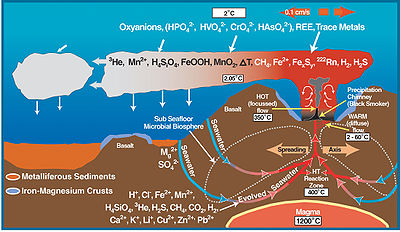- Ocean chemistry
-
Ocean chemistry, also known as marine chemistry, is influenced by turbidity currents, sediments, pH levels, atmoshperic constituents, metamorphic activity, and ecology. The field of chemical oceanography studies the chemistry of marine environments including the influences of different variables.
Contents
Marine chemistry on Earth
The marine chemists that study the science of oceanography discovered special marine environments are created around black smokers and cold seeps on the ocean floor, with entire ecosystems of organisms that have a symbiotic relationship with bacteria and hydrocarbon compounds that provided energy through a process called chemosynthesis.
Scientific studies have also shown the impact of increased carbon dioxide levels in the Earth's atmosphere on ocean chemistry from anthropogenic factors is an important area of study related to global warming and climate change. Researchers are studying how anthropogenic factors will impact and influence ocean chemistry and the related ecology of marine environments over the short and long term.
Scientists have expressed concern over increased carbon dioxide levels being absorbed into the oceans and causing acidification.[1] The phenomenon has been implicated by scientists studying declining oyster populations on the pacific coast of the United States.[1] One proposal suggests dumping massive amounts of lime, a base, to reverse the acidification and "increase the sea's ability to absorb carbon dioxide from the atmosphere".[2][3][4]
Marine chemistry on Enceladus
A planetary scientist using data from the Cassini spacecraft has been researching the marine chemistry of Saturn's moon Enceladus using geochemical models to look at changes through time.[5] The presence of salts may indicate a liquid ocean within the moon, raising the possibility of the existence of life, "or at least for the chemical precursors for organic life".[5][6]
References
- ^ a b Craig Welch Shift in Pacific’s chemistry may be killing sea life July 4, 2009 Seattle Times
- ^ Duncan Clark Cquestrate: adding lime to the oceans; Putting lime into the oceans has the potential to decrease ocean acidity and reduce atmospheric CO2 levels 13 July 2009 The Guardian (UK)
- ^ Ian Katz 20 ideas that could save the world; Dump Billions of Tons of Limestone Into 13 July 2009 The Guardian (UK)
- ^ http://www.infrastructurist.com/2009/07/14/from-the-uk-20-bold-schemes-that-could-save-us-from-global-warming/ July 14, 2009 Infrastructurist
- ^ a b Pete Spotts Cassini spacecraft finds evidence for liquid water on Enceladus June 25, 2009 Christian Science Monitor
- ^ Sodium salts in E-ring ice grains from an ocean below the surface of Enceladus Nature 459, 1098-1101 (25 June 2009) Nature
External links
- Ocean Surface Chemistry - Cluster of Excellence "Future Ocean", Kiel
Wikimedia Foundation. 2010.

